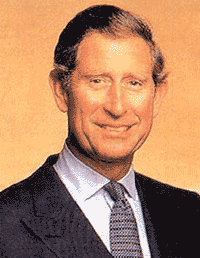Prince Charles faces process in bid to keep journals private
Prince Charles on Friday won a court judgment to block publication of further extracts from his journal, but the High Court ordered a trial to determine whether the journals should stay private a decision that could compel Charles to testify.

Judge William Blackburne said Charles could claim damages for the publication of the Hong Kong journal, and to seek a permanent injunction on the contents of his Hong Kong journals.
However, the judge said he was unwilling to bar publication of the other journals without knowing what they contain.
Charles, 57, sued the publisher of The Mail on Sunday newspaper, which in November published portions of the diary kept during a 1997 trip to mark the return of Hong Kong to China .
The prince's lawyers said the document, intended for distribution to a few close friends, was leaked by a former palace employee. They claimed invasion of privacy and copyright infringement.
The newspaper contended that publishing the diaries is in the public interest because they reveal the political beliefs of the man who would be Britain 's head of state as king.
The judge said there was "every reason" to conclude that Charles was also entitled to an expectation of privacy for the other seven journals, but was unwilling to grant a summary judgment without knowing what the journals say.
"For all the court knows, circumstances may arise which may make disclosure an entirely appropriate exercise of the defendant's right of freedom of expression," Blackburne added.
Publication of the prince's sometimes curmudgeonly political opinions and the claim by a former aide that Charles often wrote to politicians to offer his "dissident" opinions also raised questions about the role of the monarchy in modern Britain.
Charles' caustic comments about Chinese officials in the Hong Kong journal drew particular attention.
"For the handover this hall had been transformed into a kind of Great Hall of the People of Peking. After my speech the (Chinese) president detached himself from the group of appalling old waxworks who accompanied him and took his place at the lectern," Charles wrote.
"He then gave a kind of 'propaganda' speech, which was loudly cheered by the bused-in party faithful at the suitable moment in the text. At the end of this awful Soviet-style display we had to watch the Chinese soldiers goose step on to the stage and haul down the Union Jack and raise the Chinese flag. The ultimate horror was the artificial wind which made the flags flutter enticingly."
Members of the royal family have rarely appeared in court.
Charles' sister, Princess Anne, was in court in 2002 to plead guilty to a charge that one of her dogs attacked two children.
Queen Victoria 's heir, the future King Edward VII, gave evidence in a divorce case in 1870 when he was accused of being a lover of Lady Mordaught. In 1891, he testifed in behalf of a friend, William Gordon-Cumming, who had been accused of cheating at baccarat, reports the AP.
D.M.
Subscribe to Pravda.Ru Telegram channel, Facebook, RSS!


